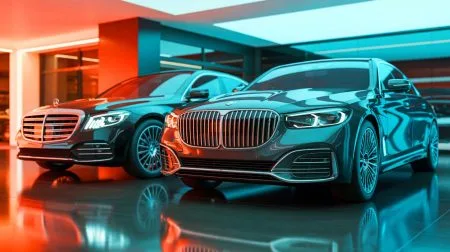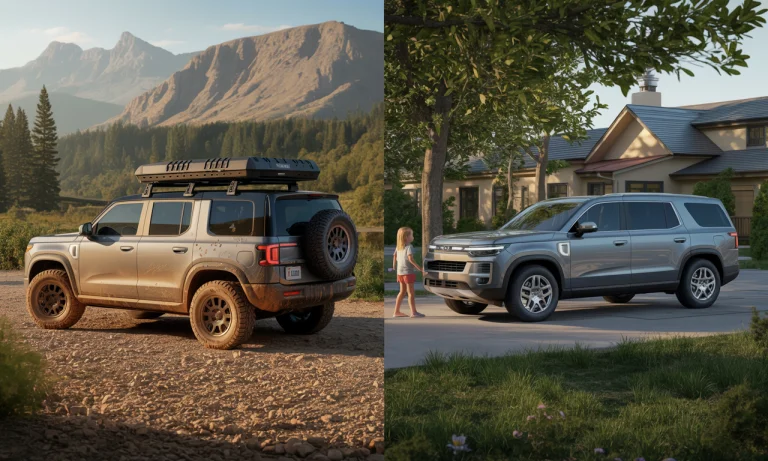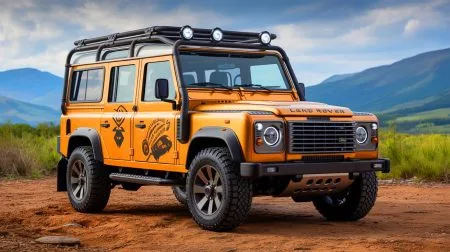Behind every SUV parked along a city street, rumbling down dirt roads, or crammed with weekend camping gear, there’s a story—a busy family juggling soccer drop-offs, a couple escaping for adventure, a commuter seeking comfort after long days. Choosing the right SUV isn’t just an item on the to-do list; it’s a turning point in daily life. The market today teems with possibilities from giants like Toyota, Honda, Ford, and upstarts from Hyundai or Kia, all promising that elusive fit for every routine and aspiration. As 2025 unfolds with smarter tech, cleaner drivetrains, and the ever-blurring line between needs and desires, finding the perfect vehicle is about more than checklists: it’s about designing the future you want for yourself, down to the last detail. Let’s step into the experience and discover how to choose the SUV that tells your story—with confidence, clarity, and lasting satisfaction.
Matching SUV Choices with Lifestyle Priorities
The process starts not at the dealership, but in the flow of your own days. Consider Emily, an urban professional in Chicago. For her, an agile compact SUV with the latest city-navigation perks makes every commute feel lighter. Meanwhile, the Martinez family balances school runs, grocery hauls, and weekend escapes that demand generous cargo space and peace-of-mind safety features, which they find in the reliable Honda CR-V. And there’s Alex—a weekend warrior—calling on the muscle of Ford or Chevrolet SUVs to tow kayaks, handle rough trails, and turn spontaneous road trips into memorable stories. When aligning your SUV to your routine, reflect on driving environments, passenger needs, and even the logistics of fitting that stubborn stroller or the family’s Labrador retriever in the backseat. For more on efficient vehicle perks relevant to daily driving, see this resource on fuel-efficient cars for 2025 comparisons.
How Vehicle Personas Guide Your SUV Decision
Emily’s story is not unique. Statistics show that over 56% of SUV drivers cite family-friendly features as make-or-break factors, while 45% of current owners prioritize pet-friendliness. Features like rear climate control, easy-to-clean interiors, and flexible seating now turn heads just as much as horsepower figures. For pet lovers, the easy access of the Subaru Forester or Mazda’s flat-folding seat design brings daily convenience that quickly becomes indispensable, especially as more workplaces and community spots welcome furry passengers. This thoughtful alignment between individual needs and what manufacturers like Toyota, Nissan, Volkswagen, and others offer is what sets top choices apart. Ensuring your vehicle fits not just your driveway but your life means understanding who’ll share the road with you—kids, colleagues, or canine co-pilots.
Budgeting Smart: Total Cost of SUV Ownership in 2025
Choosing an SUV is also a financial story, layered with short-term sticker prices and long-term commitments. Take Mike, who wonders if saving up for a new Toyota over choosing a used Ford will matter after all the insurance and service bills. Beyond the allure of monthly deals, savvy buyers weigh fuel efficiency, as highlighted in this electric car range guide, plus reliability and resale value. Hybrids and EVs from Honda and Hyundai have rewritten the math on operating costs, cutting fuel bills and earning local tax incentives. Mike’s spreadsheet grows: he factors routine maintenance, unexpected repairs, and even calculates the value of a strong warranty. Understanding the financial ripple effect of each choice, especially over five or more years, is the hidden secret to enjoying your vehicle without surprise down the road.
Comparing Ownership Models: Lease, Loan, or Cash?
When Haley in Portland upgraded from a leased Kia to buying a new Subaru, she found that building equity made sense for her long-term plans, compared to cycling through leases every two years. Leases offer low payments and a taste of the new; loans build belonging with every installment; paying outright offers freedom—but also risk if needs change suddenly. Consult expert guides before making this vital choice, referencing widely-trusted sources or reaching out to models known for value retention like Toyota and Honda. As financing strategies shift and more options like electric SUVs from Nissan and Volkswagen hit showrooms, customizing a plan to your lifestyle means balancing today’s temptations with tomorrow’s security.
SUV Classes Explained for Modern Needs
The SUV badge covers a spectrum—from nimble crossovers like Mazda CX-5 and Hyundai Tucson, to sprawling three-rows like Ford Explorer and Chevrolet Tahoe—each tailored to a way of living. Compact SUVs are a boon for city maneuverability, married with advanced safety tech from Volkswagen or smart storage in Nissan models. Midsize options negotiate a truce between size and versatility, answering the call for active lifestyles. Full-sized SUVs excel for those with frequent road trips, bigger families, or a penchant for adventure, pairing durability with comfort. For eco-minded drivers, EV and hybrid SUVs from Toyota and Kia not only help the planet, but also keep wallets happy with lower lifetime costs and charging convenience. Tech features, from adaptive cruise to intuitive infotainment—often standard by 2025—elevate both the daily grind and the dream escape.
| Type | Best for | Top Features | Example Models |
|---|---|---|---|
| Compact SUV | Urban commuters, small families | Fuel efficient, easy parking | Kia Sportage, Hyundai Tucson, Mazda CX-5 |
| Midsize SUV | Active families, cargo needs | Flexible seating, safety tech | Honda CR-V, Toyota RAV4, Volkswagen Tiguan |
| Full-size SUV | Large families, towing | Third-row seating, strong engines | Ford Explorer, Chevrolet Tahoe, Nissan Armada |
| Hybrid/EV SUV | Eco-conscious, commuters | Low running costs, incentives | Toyota RAV4 Hybrid, Hyundai Ioniq 5, Kia EV6 |
Real People, Real SUV Solutions
Stories abound in every dealership. When Sofia needed cargo space for her weekend craft fairs, the generous trunk and smart partitions in the Nissan Rogue granted her both order and style. The Young family, with three kids and a golden retriever, praised Volkswagen’s clever backseat and crash test scores, tipping their decision after months of searching. Meanwhile, the allure of the eco-friendly Hyundai Ioniq 5 turned heads among Portland’s tech crowd, where range and charging time changed the game. Throughout these journeys, drivers discovered that buying the right SUV means recognizing your unique pattern and selecting a fit that grows with it.
Safety, Technology, and Reliability: Pillars of the Smart SUV Choice
Peace of mind on the road is about more than standard airbags. In 2025, features once seen as premium—automatic emergency braking, blind-spot monitors, lane-keeping assist—now come standard on models from Honda, Toyota, and beyond. Reliability remains a defining value, with J.D. Power and Consumer Reports consistently rating Subaru, Toyota, and Mazda at the top for longevity and minimal repairs. As technology shapes more aspects of daily driving—voice-activated systems, wireless Apple CarPlay, over-the-air updates—the best SUVs become extensions of their owners, adapting, protecting, and surprising in equal measure. In the rush of daily life, investing in robust safety and proven dependability is the thread that holds every journey together.
| Feature | Security Advantage | Standout Model |
|---|---|---|
| Automatic Emergency Braking | Reduces collision risks | Honda CR-V |
| Blind Spot Monitoring | Improves lane change safety | Volkswagen Tiguan |
| Adaptive Cruise Control | Cuts commute fatigue | Subaru Forester |
| Predictive Maintenance Alerts | Prevents breakdowns | Toyota RAV4 Hybrid |
Test Driving and the Final Decision
After weeks of research, the culminating point for every buyer is the test drive—the real-world moment where specs meet sensation. Dani, facing a dilemma between a Mazda and a Volkswagen, realized during a test loop which cabin fit felt like ‘home.’ Scrutinize seating comfort, experiment with digital controls, check cargo functionality, and envision the routines you’ll depend on this machine for. Comparing your shortlist, talk to owners, and revisit initial expectations will make that final judgement both informed and satisfying. When the decision is finally locked in, it anchors not just your mobility but the next chapter of your daily story, welcoming new adventures and small joys alike.
Questions About Choosing the Perfect SUV
How do I pick between a hybrid and a gasoline SUV?
Consider your typical mileage, access to charging, and local fuel prices. While hybrids from brands like Toyota and Hyundai reduce long-term costs, gas models from Ford or Chevrolet may excel in towing or rugged demands. Evaluate incentives and lifetime savings using the latest rankings for fuel-efficient cars.
What features should families prioritize in a new SUV?
Prioritize spacious, flexible seating, advanced safety systems, and rear-seat amenities. Models like Honda CR-V, Volkswagen Tiguan, and Subaru Forester deliver both security and comfort for growing families and pets.
Is resale value important when choosing an SUV?
Absolutely. Brands such as Toyota, Honda, and Subaru are renowned for retaining value. High resale value minimizes long-term costs and offers flexibility if your lifestyle changes or you want to upgrade.
Are there hidden costs to owning an SUV?
Yes. Insurance, fuel, unexpected repairs, and upgrades for tech or winter driving all add up. Research average maintenance costs specific to models—Nissan, Kia, or Mazda—and balance these with warranties and overall reliability ratings.
How can I make my test drive more effective?
Simulate your daily routes. Test the infotainment system, backseat access, and load the cargo space with typical gear. Reading owner reviews and watching expert video guides before hitting the lot sharpens your perception of subtle but crucial differences among models like Chevrolet, Hyundai, and Volkswagen.
Did you like it? 4.4/5 (20)







